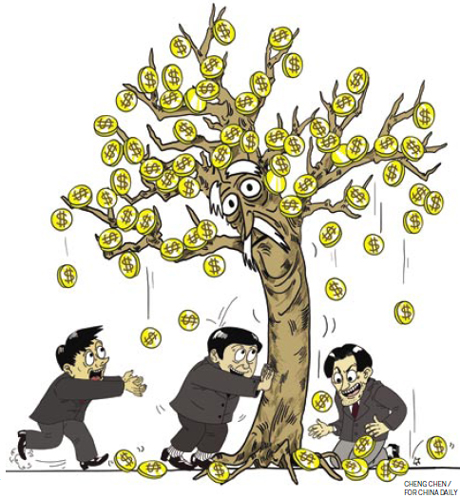Cover Story
Longer in the tooth but still a catch
By Wang Zhuoqiong (China Daily)
Updated: 2010-07-27 16:49
 |
Large Medium Small |
|
 |
BEIJING - Who says the older people get, the more invisible they become?
Small companies are catching on to the growing needs of a rapidly expanding elderly population in China for medical and daily necessities as well as other new niches in the so-called silver-hair industry.
Wang Zhenyao, former director of the social welfare and charity promotion department of the Ministry of Civil Affairs, recently said that the market oriented toward the elderly may be worth at least 1,000 billion yuan ($147 billion).
With life expectancy levels rising in China, the country has entered an era that's tailor-made for small firms. Small businesses are planning services such as on-site medication monitoring, assistance with meals, housekeeping services and local transportation.
"The elderly who were born after the founding of new China have been educated and are retired with pension. Without housing debts to pay back, elderly Chinese have more capital these days and they are willing to spend," said Ma Fengli, deputy director of social welfare and industry at the China Research Centre on Aging. "Those who don't have the savings are supported by their affluent, middle-aged children. Long-term speaking, the market for silver hairs is very promising."
Beijing Capitel Co Ltd is one such company. It has developed a mobile phone for seniors and sold 700,000 sets last year to reach a revenue of 200 million yuan.
The company is expected to sell 1.5 million of the elderly oriented phone, priced at 300 yuan, in China and abroad this year, said Zhao Baodong, marketing manager of Shenzhen-based Newplan Design Company, which designed and is marketing the phone.
"When we first entered the mobile phone market, we noticed there was a phone for business people, for women, and even for children, but none for the elderly," Zhao said.
The Capitel phone is designed with a large keypad, louder tones and an emergency speed-dial.
Zhao said that when the product was first released, the response was cold.
"Sales agents didn't like it," Zhao said. "They thought that the phone's profit margin would be low and that its potential buyers had a low buying power."
Then the company started over in local communities in major cities. The reaction was a surprise.
"People - old and young - found the idea fresh and useful," he said. "In fact, 80 percent of our products were purchased as presents for their parents. That is why we sell 40 percent of our products on websites, where most young people do their shopping."
The company is planning a mobile-phone based software platform that offers the elderly service in medical care and entertainment through a collaboration with China Mobile.
Investors are also planning to take advantage of the business opportunities within the silver-haired population.
Wu Congxin, former manager at a pharmaceutical company in China, noticed a scrubbing pad for artificial teeth during a business trip to Europe.
"I've always wanted an idea that the big manufacturer passed on, where the small startup couldn't afford the cost of technology investment, and of course, it must have a potential market," said Wu, president of Beijing Greenland Biotech Co, a company founded in 2009 that caters to the rising demand of oral hygiene among China's elderly population. "The country is aging so fast. Elders with artificial teeth will need this."
China has an ever-increasing elderly population and a growing awareness in oral hygiene, Wu said.
But the sales so far remain sluggish due to the lack of consumption and hygiene habits among seniors.
"The marketing is difficult," Wu said. He added about 75 percent of seniors with artificial teeth failed to meet the standard of cleaning their artificial teeth.
By the end of last year, China had 167 million people aged 60 and above, or half of the US total population. That figure was up 4.53 percent from the previous year, or 12.5 percent of the total population, according to the Ministry of Civil Affairs.
The life expectancy now exceeds 73 and the incomes of seniors are also rising. Statistics from the China Research Center of Aging said that 42.8 percent of seniors in the urban areas are saving money with 45 percent of seniors between the age of 60 and 65 holding onto their jobs.
"The sun of the aging population is setting, but the industry to take care of the elderly are rising," said Ma Fengli, at the China Research Center of Aging.
The family-oriented model in taking care of the elderly has been a long tradition in China. But that model has been gradually replaced by a rising number of public and professional services.
But the senior market is still in its infancy with about 84.2 percent elders not yet needing service or care. Experts and industry investors have called for more support in government policy.
"There is lack of government policies that favors businesses and institutions that provide services to the elders. The care for them should not only reply on the government but also from society and private sector," said Wang Xiaoyan, director of Community Alliance, a Chinese independent nonprofit organization. It aims to create a better environment for China's elderly.
She said that investors should get ready for upcoming opportunities in the silver hair industry in a decade or so.
"The first generation of people who gave birth to one child is expected to enter their 60s then. They have more pensions and have cultivated a higher taste in services and less chances to be looked after by their child," Wang said. "But the ripe timing comes only when the government, businesses and consumers are all ready."
China Daily